Great expectations for Chile's new president
- Published
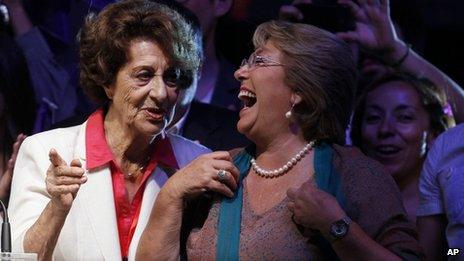
Michelle Bachelet (right) won more than 60% of the vote
Winning Chile's presidential election was pretty easy for Michelle Bachelet.
She led the contest from the start and never faced much of a challenge from her bickering centre-right opponents.
The hard part will start in March when she takes office.
Ms Bachelet will inherit a country with an economy that grew by 5.6% last year. Unemployment is low and inflation is under control.
But things are likely to get worse. The growth rate is expected to ease to 4.2% this year and the central bank warns it might drop below 4% in 2014.
The price of copper, Chile's main export commodity, is seen extending its recent decline and the bank expects the country's trade surplus to shrink to $600m (£368m) in 2014 from $2.5bn in 2013.
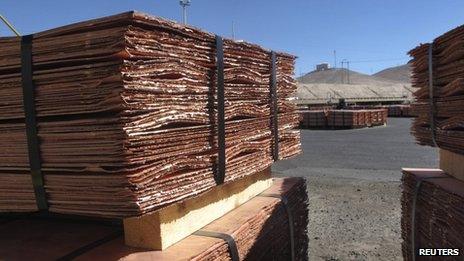
Copper is Chile's main export commodity, but its price has been falling
None of this is good news for an incoming president who is promising sweeping and expensive social reforms.
Education first
Ms Bachelet has placed education at the top of her priorities.
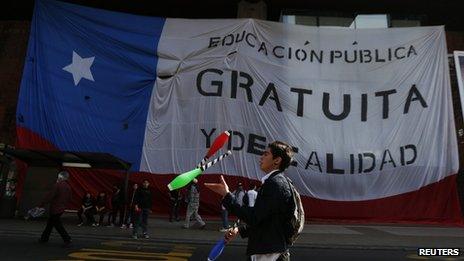
Students in Chile have been demanding free public education
At the moment, Chile's schools and universities rely heavily on household funding to supplement the meagre contributions they get from the state.
She wants to change that, turning the entire apparatus into a state-funded system within six years.
By the end of her four-year term she has promised that the state will pay the tuition fees of the poorest 70% of Chile's higher education students.
"Her proposals reset the clock for the education system, and she'll probably have the support in parliament she needs to get them passed," says Kirsten Sehnbruch, professor of public policy at the University of Chile.
"But the big problem with this strategy, aside from it being a significant investment, is that is doesn't address the issue of quality."
Costly promises
Even Ms Bachelet's closest aides acknowledge her education reforms will be costly, eating up an extra 1.5% to 2% of gross domestic product each year.
She says that money will come from taxes, particularly on big business.
Ms Bachelet plans to raise Chile's basic corporate tax rate from 20% to 25% over four years and to abolish a mechanism that allows companies to defer indefinitely the payment of tax on their re-invested profits.
"I expect the tax reform to be approved within the first year because it only requires a simple majority in parliament," says Claudio Fuentes, a political scientist at the Diego Portales University in Santiago.
"That will pave the way for education reform between 2015 and 2018. Some of the changes she wants to make in education require a fourth-sevenths majority in parliament while others require a three-fifths majority. So, on certain issues she's going to have to negotiate with the right."
New constitution
The other big pledge of Ms Bachelet's campaign is constitutional change.
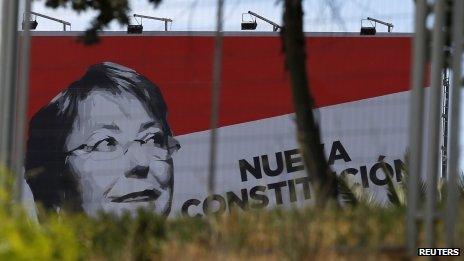
Ms Bachelet promised to reform the Pinochet-era constitution if she was elected
She says Chile needs a new constitution to replace the one drawn up under Gen Augusto Pinochet in 1980, as well as a new electoral system.
The current one ensures that the two big coalitions get almost all the seats in Congress, split fairly evenly between them. Small parties and independent candidates do not get much of a look-in.
"There's a consensus on the fact that the electoral system needs to go," Ms Sehnbruch says.
"The question is: what do you replace it with? Constitutional reform is more complex and will need more negotiation."
Deep inequality
Many Chileans want Ms Bachelet to address the country's deep economic inequalities.
Of the 34 countries of the Organisation for Economic Cooperation and Development (OECD), Chile has the biggest gap between rich and poor.
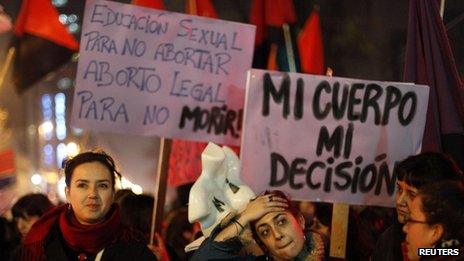
Activists have been demanding a change to Chile's strict abortion laws
She will also come under pressure from some quarters on ethical issues such as abortion and gay marriage.
At present, Chile has some of the strictest abortion laws in the world. The practice is illegal in all circumstances, even in cases of rape or when the mother's life is in danger.
Ms Bachelet, a paediatrician by training, wants to change that and has also come out in favour of gay marriage, although the majority of Chileans oppose it.
"I imagine that therapeutic abortion will be legalised but gay marriage at this stage is unlikely to be passed," Ms Sehnbruch says.
Ms Bachelet will have to work hard to keep her broad centre-left coalition united.
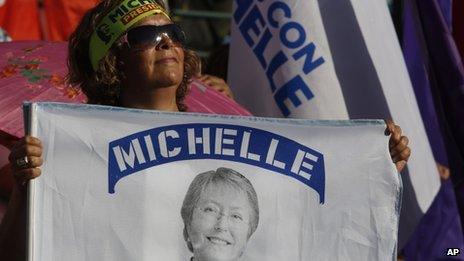
While Ms Bachelet has broad support, she will have to keep her coalition on board
The last time she was in power, she governed at the head of a four-party bloc, the Concertacion, but his time around she has seven parties in her rebranded New Majority coalition.
"There are sure to be some problems," Mr Fuentes warns. "Managing seven parties is always going to be trickier than managing two or three."
That said, Ms Bachelet will at least enjoy a healthy parliamentary majority, something she lacked during her first term from 2006 to 2010.
Her coalition will have 68 seats in the 120-seat lower house and 21 of the 38 seats in the Senate.
This should allow her to push through basic legislation quickly and easily.
High hopes
On foreign policy, Ms Bachelet will seek to improve ties with Chile's northern neighbours Peru and Bolivia, both of which have taken Chile to the International Court of Justice (ICJ) in The Hague over border disputes.
The ICJ is due to rule on Peru's claim in January, before Ms Bachelet takes office. The Bolivian verdict is not expected for some years.
But perhaps the biggest challenge facing Ms Bachelet is the weight of expectation.
After four years of centre-right rule, marked by huge street protests organised by students, workers and environmentalists, Chileans are clamouring for change.
"Expectations are very high, and not just among ordinary people but among the centre-left political elite," Ms Sehnbruch explains.
"The opportunity to make significant changes has now come and yet the presidential term is only four years long.
"To reconcile those two things - the massive agenda of what people want with the reality of what you can do in four years - is going to be very challenging."
- Published16 December 2013
- Published17 November 2013
- Published9 September 2013